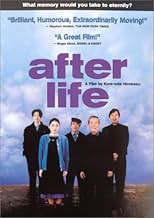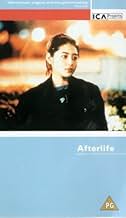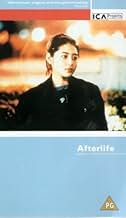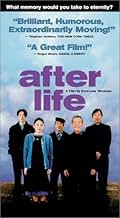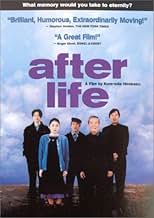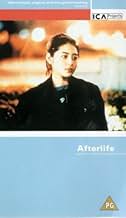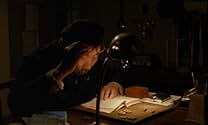IMDb RATING
7.6/10
15K
YOUR RATING
After death, people have a week to choose only one memory to keep for eternity.After death, people have a week to choose only one memory to keep for eternity.After death, people have a week to choose only one memory to keep for eternity.
- Awards
- 7 wins & 8 nominations total
Arata Iura
- Takashi Mochizuki, counselor
- (as Arata)
- Director
- Writer
- All cast & crew
- Production, box office & more at IMDbPro
Featured reviews
"When we come to the last moment of this lifetime and we look back across it, the only thing that's going to matter is 'What is the quality of our love?" - Richard Bach
One of the most commonly reported aspects of near-death experiences is the life review, the seeing and re-experiencing of major and trivial events of one's life, sometimes from the perspective of the other people involved. Most say that the single most important lesson they learned is that the actions we think are trivial and unimportant turn out to be the most important, especially ones that involve spontaneous acts of love. While not exactly a life review, in After Life by Hirokazu Koreeda, a group of recently deceased people are asked to look back at their life and choose only one memory from their life that they want to take with them to eternity. The process compels people to look at their life in its entirety and see what worked and what was missing.
Set in a dreary barracks-like way station, civil servants meet with those just crossed over to help them choose the experience they want to hold on to. For some, the choice is easy, for others it is difficult. Those that will not or cannot choose are consigned to work in the substation with the newly deceased until they are ready to move on. The counselors work one on one with each individual telling them that they have three days to make their choice. Once a memory is selected, a film crew recreates the memory-- sets are built and the little touches of sights and sounds are selected until the deceased are satisfied that they are witnessing a perfect recreation of their experience. It is that film that they take with them, not the original memory.
At first some choose things such as a trip to Disneyland, a sexual encounter, or a memorable bowl of rice but later gravitate toward experiences that are more meaningful. The center of the film revolves around those who are unable to choose. Ichiro Watanabe (Taketoshi Naito) is a 70-year old management consultant who has led an uneventful life and is challenged to find a memory he thinks is worth preserving for all time. To help him in this process, he is allowed to scan through piles of videotapes representing each year of his life. One young man wants to choose a dream instead of an actual event. Another wants to forget his past entirely, and an elderly woman is stuck in the mindset of a nine-year old girl.
After Life is the story of the caseworkers as well. Takashi Mochizuki (Arata) has been stuck in limbo because he cannot find any happiness in his twenty-two years until he realizes how his short life deeply affected someone else. His perfect realization also affects a co-worker Shiori (Erika Oda) who has fallen in love with him. After Life is a beautiful and touching film that allows us to reflect on the things that brought us joy in our own life, and to recognize that true happiness lies, not in outward symbols of success, but in giving ourselves to others.
One of the most commonly reported aspects of near-death experiences is the life review, the seeing and re-experiencing of major and trivial events of one's life, sometimes from the perspective of the other people involved. Most say that the single most important lesson they learned is that the actions we think are trivial and unimportant turn out to be the most important, especially ones that involve spontaneous acts of love. While not exactly a life review, in After Life by Hirokazu Koreeda, a group of recently deceased people are asked to look back at their life and choose only one memory from their life that they want to take with them to eternity. The process compels people to look at their life in its entirety and see what worked and what was missing.
Set in a dreary barracks-like way station, civil servants meet with those just crossed over to help them choose the experience they want to hold on to. For some, the choice is easy, for others it is difficult. Those that will not or cannot choose are consigned to work in the substation with the newly deceased until they are ready to move on. The counselors work one on one with each individual telling them that they have three days to make their choice. Once a memory is selected, a film crew recreates the memory-- sets are built and the little touches of sights and sounds are selected until the deceased are satisfied that they are witnessing a perfect recreation of their experience. It is that film that they take with them, not the original memory.
At first some choose things such as a trip to Disneyland, a sexual encounter, or a memorable bowl of rice but later gravitate toward experiences that are more meaningful. The center of the film revolves around those who are unable to choose. Ichiro Watanabe (Taketoshi Naito) is a 70-year old management consultant who has led an uneventful life and is challenged to find a memory he thinks is worth preserving for all time. To help him in this process, he is allowed to scan through piles of videotapes representing each year of his life. One young man wants to choose a dream instead of an actual event. Another wants to forget his past entirely, and an elderly woman is stuck in the mindset of a nine-year old girl.
After Life is the story of the caseworkers as well. Takashi Mochizuki (Arata) has been stuck in limbo because he cannot find any happiness in his twenty-two years until he realizes how his short life deeply affected someone else. His perfect realization also affects a co-worker Shiori (Erika Oda) who has fallen in love with him. After Life is a beautiful and touching film that allows us to reflect on the things that brought us joy in our own life, and to recognize that true happiness lies, not in outward symbols of success, but in giving ourselves to others.
The movie is told in such a way that the people coming in reveals themselves in such a way that they all realize that there is a part of themselves in which it is truly good, even if it is deeply buried. The way it is filmed, as if it is a documentary, provides the cunning realism that you would not ordinarily achieve in regular film. Even at the end, we discover the true reason one of the counselor stayed around instead of moving on. Truly a touching and thought provoking film. It will make you try to think for yourself which memory you would cherish forever, even if it is single one.
Every Monday morning, a team of advisors welcome in a facility a group of people that has just died with the mission of helping each one of them to select their best memory that will last for the eternity in the first three days. On Thursday, filmmakers begin to recreate the selected memory, and in the end of the week they screen it in a movie theater and he or she moves to Heaven.
I bought "Wandâfuru Raifu", or "After Life" on DVD, since I was very intrigued with the summary on its cover. I saw this low budget movie spoken in Japanese with English subtitles and I found the story very original and provocative. The premise of rebuilding eternity along a week, like God created Earth, and Heaven be a projection of a movie of the best memory one could have, is fantastic. In spite of having unexplained points, like for example the need itself of lasting with only one single memory, and inconsistencies, like why the need of shooting the memory, if the staff can bring videotapes of the entire life, what matters is the originality of this unique movie. One point that has always impressed me in cinema is the fact the actors and actresses last forever in the eyes of the audiences along generations. In this movie, each one of us has the chance to be an actor or actress, and write our own screenplay. Further, I personally recalled many good moments of my life just because of the storyline of this movie, and I found how difficult it could be to select only one good moment of my life to last forever. My vote is seven.
Title (Brazil): "Depois da Vida" ("After Life")
I bought "Wandâfuru Raifu", or "After Life" on DVD, since I was very intrigued with the summary on its cover. I saw this low budget movie spoken in Japanese with English subtitles and I found the story very original and provocative. The premise of rebuilding eternity along a week, like God created Earth, and Heaven be a projection of a movie of the best memory one could have, is fantastic. In spite of having unexplained points, like for example the need itself of lasting with only one single memory, and inconsistencies, like why the need of shooting the memory, if the staff can bring videotapes of the entire life, what matters is the originality of this unique movie. One point that has always impressed me in cinema is the fact the actors and actresses last forever in the eyes of the audiences along generations. In this movie, each one of us has the chance to be an actor or actress, and write our own screenplay. Further, I personally recalled many good moments of my life just because of the storyline of this movie, and I found how difficult it could be to select only one good moment of my life to last forever. My vote is seven.
Title (Brazil): "Depois da Vida" ("After Life")
10Ben-113
I really loved Kore-eda's first feature "Maboroshi No Hikari", so I had been looking forward very much to seeing "Afterlife" (named "Wandafuru raifu" in Japanese, after Frank Capra's movie "It's a wonderful Life") during its run in London.
At first I noticed that the film is formally very different from its predecessor; while "Maboroshi No Hikari" owes much to the influence of Ozu, and especially Hou Hsiao-hsien, "Afterlife" draws more on the directors background as a documentary filmmaker. What the two films share, however, is the theme of memory (Note: also a theme with Hirokazu Kore-eda's documentary work - check out "Without Memory", about a man suffering of severe amnesia). In "Maboroshi No Hikari" Yumiko is not able to forget the memory of her dead husband, whereas in "Afterlife" the recently deceased must chose one memory that will accompany them into eternity.
I feel that Kore-eda handles this entirely hypothetical premise in the best possible way, by steering completely clear of the stylistic superficialities with which so many other films about life after death desperately try to make themselves believable. The unspectacular old school building as a setting, the ceiling window with its interchangeable templates for the different stages of the moon, a character who himself has doubts as to whether this is really the best way of going to the next world and the absence of any religious connotations, among other things, all serve to keep the focus on the characters and their memories - many of whom are actually real. Apart from tongue in cheek humour, the lack of music also prevents over-sentimentalization and makes the memories the people recall the more sincere. The no-budget filming of the recollections of the deceased in order to trigger their personal memory, toward the end of the movie, also illustrates that the director is fully aware of his own limitations and possibilities as a film-maker. Rather than just trying to create the illusion of some half-baked version of the hereafter, he wants to challenge the viewer to reflect on what would be his/her most important memory - and succeeds in every way.
This is a movie that surly can be appreciated by anyone who possesses at least a tiniest inkling of openness and willingness to experience cinema as more than mere entertainment. Top mark for this one!
At first I noticed that the film is formally very different from its predecessor; while "Maboroshi No Hikari" owes much to the influence of Ozu, and especially Hou Hsiao-hsien, "Afterlife" draws more on the directors background as a documentary filmmaker. What the two films share, however, is the theme of memory (Note: also a theme with Hirokazu Kore-eda's documentary work - check out "Without Memory", about a man suffering of severe amnesia). In "Maboroshi No Hikari" Yumiko is not able to forget the memory of her dead husband, whereas in "Afterlife" the recently deceased must chose one memory that will accompany them into eternity.
I feel that Kore-eda handles this entirely hypothetical premise in the best possible way, by steering completely clear of the stylistic superficialities with which so many other films about life after death desperately try to make themselves believable. The unspectacular old school building as a setting, the ceiling window with its interchangeable templates for the different stages of the moon, a character who himself has doubts as to whether this is really the best way of going to the next world and the absence of any religious connotations, among other things, all serve to keep the focus on the characters and their memories - many of whom are actually real. Apart from tongue in cheek humour, the lack of music also prevents over-sentimentalization and makes the memories the people recall the more sincere. The no-budget filming of the recollections of the deceased in order to trigger their personal memory, toward the end of the movie, also illustrates that the director is fully aware of his own limitations and possibilities as a film-maker. Rather than just trying to create the illusion of some half-baked version of the hereafter, he wants to challenge the viewer to reflect on what would be his/her most important memory - and succeeds in every way.
This is a movie that surly can be appreciated by anyone who possesses at least a tiniest inkling of openness and willingness to experience cinema as more than mere entertainment. Top mark for this one!
Afterlife is without a doubt one of the greatest Japanese films I've ever seen. Visually it is truly stunning. Kore Eda is known for his own obsession with lighting and his skill for casting shadows and beams of white light are second to none. Combined with an innovative, creative and enjoyable story that takes on a slightly supernatural docu-drama and at the same time is set in a dull, down and out halfway house between Earth(life) and heaven(afterlife). Fascinating scenes take place as the deceased have one week to decide on a single memory from their lifetime that they can keep for all eternity. He also includes elements of documentary with talking head scenes of the deceased talking about their memories. Kore Eda throws around some extremely interesting ideas and themes on life and human emotions for our memories and he genuinely makes you think about what he's said once you've finished watching.
This is a film that not everyone would enjoy due to its slow moving pace, mood orientated lighting and partly improvised script, but it is a creative masterpiece that is definitely worthy of high praise and attention.
This is a film that not everyone would enjoy due to its slow moving pace, mood orientated lighting and partly improvised script, but it is a creative masterpiece that is definitely worthy of high praise and attention.
Did you know
- TriviaMuch of the action in After Life is shown as interviews conducted with the recently deceased regarding their lives. Some of these interviews were scripted, but many were done impromptu, with real people (not actors) reminiscing about their own lives.
- Quotes
Kenji Yamamoto, who wants to forget his past: Say I choose a memory, from when I was eight or ten years old. Then I'll only remember how I felt back then? I'll be able to forget everything else? Really? You can forget? Well, then that really is heaven.
- How long is After Life?Powered by Alexa
Details
Box office
- Gross US & Canada
- $801,985
- Opening weekend US & Canada
- $11,791
- May 16, 1999
- Gross worldwide
- $801,985
Contribute to this page
Suggest an edit or add missing content



